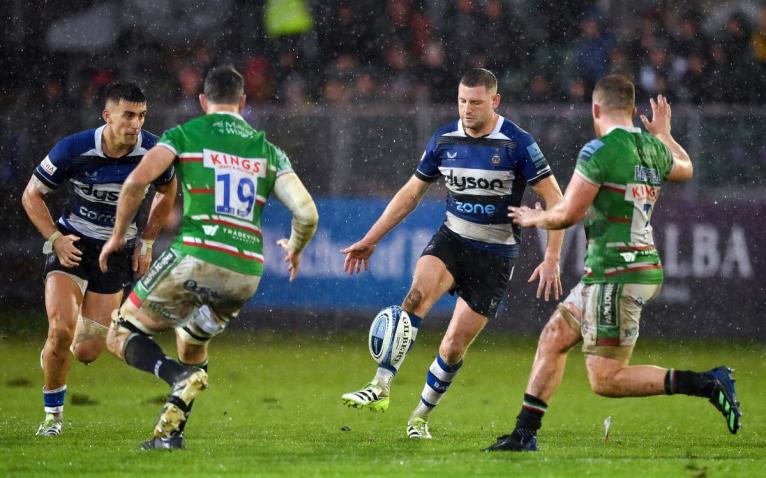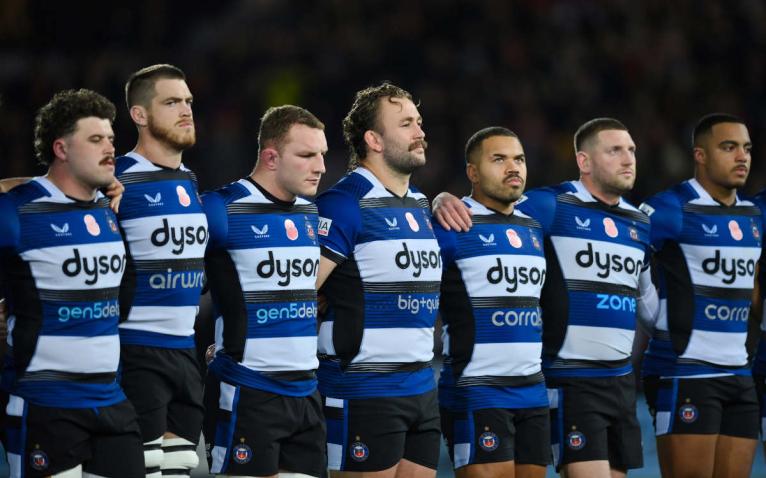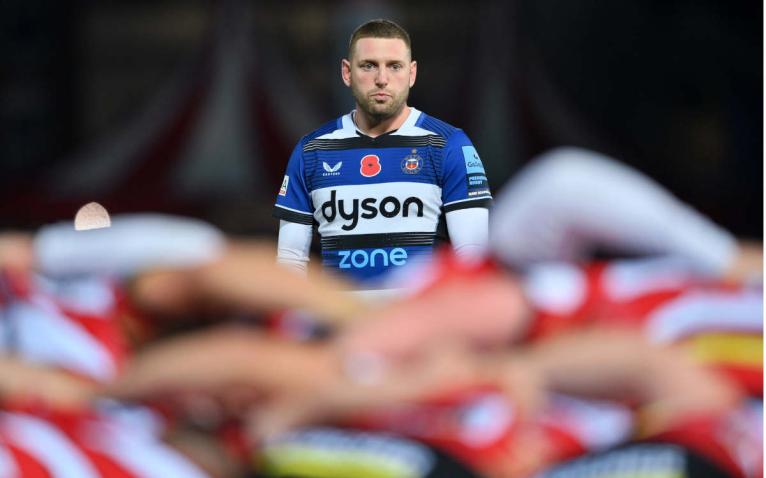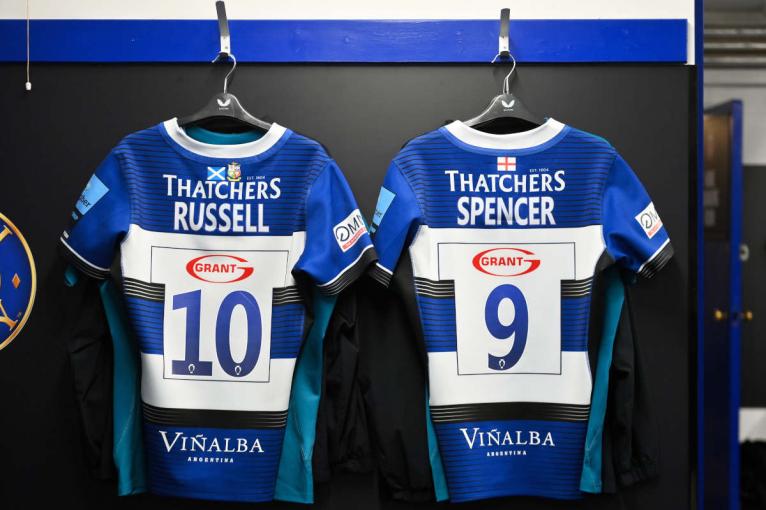Finn Russell is a man of culture. Let us count the ways. In little over a month, the Scotland fly-half is redefining the culture within his new club, Bath, while at the same time becoming something of cultural phenomenon within the wider Gallagher Premiership. Then there is his play itself: cultured in the sense of being compelled by an off-the-cuff artistic sensibility that can takes its viewers to the brink of beauty.
“Calm down!” you might protest. “Finn’s only been in the Premiership for a matter of weeks, and he’s not been flawless.” True enough. But let’s scrutinise that four-letter word: calm.
Speaking to senior figures in the Bath camp ahead of the derby with Bristol, “calm” was the recurring description of Russell, and his influence on the players around him was – more than anything – said to be calming.
All of which is, perhaps, something of a surprise when you consider the received opinion of Russell’s style: the impulsive genius (occasionally flawed) who keeps everyone guessing. And some might point to his potential for being an HR loose cannon – has he not had the odd well-documented run in with the Scotland rugby authorities, which could be designated disruptive rather than settling?
But calmness is closely allied to confidence. A belief in your own abilities – and in the people around you – invariably leads to a sense of composure. Russell trusts his abilities. And that, when in harness with his shrug-of-the-shoulders boyish disposition, infuses those around him with a sense of the Possible. Sport, like politics, is the art of the possible. And Russell compels a re-evaluation of what constitutes the possible on a rugby pitch.

As part of that re-evaluation, Russell is defying the doubters and the nay-sayers. Following the announcement of his signing a year ago, there was a vocal body of opinion which claimed that Russell would be a poor fit at Bath. That his attack-minded instincts wouldn’t prosper on the soggy Recreation Ground turf. That those same instincts would be at cross-purposes with the more conservative ‘South African’ style of play supposedly favoured by Bath head of rugby Johann van Graan. Those doubters look to have been unduly pessimistic – both of Russell and of van Graan.
Vitally for a league that flows straight on from rugby’s global jamboree, it turns out that Russell doesn’t suffer from World Cup hangovers. And that will be some relief to Bath fans with half-decent memories. Back in 2011, a certain Stephen Donald – fresh from kicking the winning points for New Zealand in the 2011 World Cup final – arrived in Bath for a sojourn that was hardly a happy period for either party.
Since arriving at Bath’s Farleigh House base within hours of Scotland being knocked out of the World Cup by Ireland, Russell has shown a clear head and a willingness to knuckle down. There appears to have been a bounce in his step from day one, a bounce that blends a happy-to-be-alive exuberance with a smidge of swagger.
Russell’s international adversary Sam Underhill is one of those to have been struck by the ripple-effect of his new team-mate’s demeanour. “Finn is very calm, quite a relaxed guy,” says the England flanker, himself riding a wave of strong form. “He’s obviously very talented with ball in hand and very creative, and he has that coolness and calmness to him which is what we want our big players to have.”
Kick, pass or run. The Premiership has already seen them all from Russell. The box-office signing has wasted no time in dipping into his box of tricks.
And the good news for Russell is that Underhill and the rest of an increasingly hard-spined Bath pack appear fully focused on giving their new playmaker the proverbial armchair ride.
“You don’t want your 10 to be making all the decisions,” says Underhill. “You want to make their life as easy as possible. As a team, as a forward pack, you need to give them the time and space to make decisions – to kick, pass or run.”
Kick, pass or run. The Premiership has already seen them all from Russell. The box-office signing has wasted no time in dipping into his box of tricks. Again, let us count the ways: the kick-pass to Will Muir in the wettest of conditions against Leicester; the varied distribution to his centres in the middle third of the pitch; the arcing runs and off-loading guile against Saracens.

Alongside the fly-half’s staple diet of kick, pass and run we can add a fresh and zesty new ingredient: the Shush. Russell’s much-discussed finger-to-lips gesture in front of The Shed at Kingsholm went viral. It was an interesting way to ingratiate oneself with Gloucester’s rugby-loving fraternity, but the winning smile with which it was delivered ensured that it was far more of a positive gesture than a negative one – a tease rather than a taunt.
“The Shed gives every goal-kicker some grief before the game and I think Finn and The Shed struck up a very good relationship,” says van Graan through a knowing smile. “Finn is his own man and we enjoy who he is. It was all in good spirits. It was well-received by Gloucester supporters in The Shed. It was good for rugby in the sense of the spirit in which the game was played. Let’s speak of the great things in the game: the characters and the spirit in which it’s played.”
Van Graan touches on another facet of Russell’s cultural currency: he is a player who has the potential to transcend the game through the force of his character, and to take rugby out of its narrow hinterland and into fresh markets. And in the aftermath of three Premiership clubs going bust inside one year, that kind of currency is gold dust to the league and the game at large. Finn Russell is no marketing gimmick, but his ball skills combined with his effervescent personality make him a sports marketer’s dream. His wage as Bath’s marquee player may well cost Bath a bob or two, but his potential to pull in new blood to the game – new sponsors, new fans, new money – could be a key element in enabling the Premiership to wash its own face.
Finn was absolutely somebody who I wanted. If you look at teams that are championship-winning teams then they have certain things in common: leadership, special players, a tight five, an exemplary defence and a ten that plays test rugby.
Johann van Graan
Russell is fast becoming the shining light of a Premiership whose dark firmament is in dire need of stars. Yet he is a star whose feet appear to be firmly on the ground. Those around Bath emphasise his commitment to the common cause, for all his individual maverick flair.
“Finn is a world-class player, but he fits in with this group and what this team wants to do,” says van Graan, a polite and friendly man, but certainly not one with an obvious tendency to indulge prima donnas.
“Finn was absolutely somebody who I wanted. If you look at teams that are championship-winning teams then they have certain things in common: leadership, special players, a tight five, an exemplary defence and a ten that plays test rugby. I took my time [last year] and decided we needed a test 10. I did my research and homework and I made it known to the rest of the coaches and the chairman that I was going to target a certain individual.

“Finn and I immediately made a very good connection about how we see the game.
“You’ve got to look at his game pretty closely because some people only remember the big moments. People don’t always see how brave he is in defence and he makes a lot of people around him calm.”
Key to that much-referenced calmness is Russell’s kindness to himself. Mistakes, when they inevitably happen, appear to be swiftly forgotten; there are no signs of lingering self-persecution. A player cannot play as Russell does – with radar constantly twitching and finger constantly hovering over the trigger – without the odd misfiring pass or kick. What’s crucial is how the player responds when the target is missed. And, in the team context, how the team responds when their playmaker errs.
The Spencer-Russell pairing is a well-balanced one, with the former’s pace sitting will alongside the latter’s vision. They are both genuine footballers too, and that enables them to both pragmatically guide Bath around the field and to also keep defences guessing.
It didn’t all go according to plan for Russell on Friday in the West Country derby against Bristol. There was little beauty in some of his brushstrokes. He missed a sitter from the tee. He threw a pass that was intercepted and led to a try that briefly tipped the scales in a Bristolian direction. But things did not fall apart when he wobbled. Instead, there was a composure and a resilience, both individually and collectively. Bath still won. And therein lies an important sign for the club.
Bath are greater than the sum of their parts with Finn at the helm, but they are far from being a one-man side. Last season, Ben Spencer appeared to carry a lot on his shoulders. Much of Bath’s play pivoted around the scrum-half, and much of the leadership responsibilities seemed to weigh on him, too. To Spencer’s absolute credit, he performed brilliantly and can count himself unfortunate not to have been picked in England’s World Cup squad. Yet with Russell alongside him in the half-backs there is a sense of a problem shared being a problem halved for the Bath captain.
The Spencer-Russell pairing is a well-balanced one, with the former’s pace sitting will alongside the latter’s vision. They are both genuine footballers too, and that enables them to both pragmatically guide Bath around the field and to also keep defences guessing.

Russell is not the only stylish ball-handler in Bath’s backline: Cameron Redpath and Max Ojomoh are also skilled distributors and both showed their class against Bristol and Gloucester respectively. Ollie Lawrence is the perfect foil – delivering power and agility to complement the distributors around him. Out wide, Joe Cokanasiga and Will Muir bring a surging directness. There are plenty of options for Russell to play with, yet Bath must not fall into the trap of over-playing the Scotland international. Bath’s second-choice fly-half, Orlando Bailey, will need to be kept sharp, not least for when Russell heads off on international duty. Bath’s assistant coach Lee Blackett, an attack specialist, has a central role to play in this regard, in further honing both Russell’s and Bailey’s games.
Earlier this season, Tom Dunn, the long-serving Bath hooker, spoke of the “toxic motivation” that was driving him on to win silverware for his home-town club. The heavy beatings, low league finishes and varied disappointments of the past decade are clearly lodged in the memory, tugging at the psyche. But with Russell at The Recreation Ground the toxicity looks to be evaporating. For years Bath have strived to recapture the glory days of the late-amateur era. And perhaps they have strived a little too hard – slightly forced, slightly desperate. In Russell, there is the hope of capturing a new lightness of being. His disarming yet potent blend of brio and insouciance could be just the tonic to ease the weight of Bath’s history. With their new fly-half, it may just be that Bath are able to keep calm and carry on.


Comments
Join free and tell us what you really think!
Sign up for free